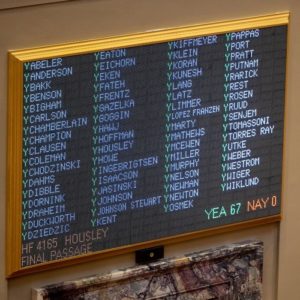In less than three weeks – nearly unheard of speed by the Minnesota Legislature – a bill that will divest state funds from Russia and Belarus unanimously passed its final hurdle in the legislative process Tuesday and will be signed into law.
The bill was introduced to the public by a bipartisan group of legislators, Ukrainian-American activists, and the Jewish Community Relations Council of Minnesota and the Dakotas, on March 10. The bill had its final vote – 126-0 in the House on March 24. On March 29, it passed the Senate 67-0.

State Sen. Karin Housley, the lead author of the Senate’s Russian divestment bill, on the floor of the House on March 29. (Ethan Roberts Photography/JCRC)
“[T]he Senate joined the House to unanimously vote for divesting assets from Russia,” lead Senate author, Sen. Karin Housley (R-39), said in a statement after the passage. “We are sending a message that Minnesota stands with Ukraine and all free democracies – we support Ukraine’s right to peacefully exist, and we firmly stand against the violence and atrocities being committed by Putin and his war machine.”
The legislation requires Minnesota, primarily the State Board of Investment (SBI), to divest its direct holdings of Russian and Belarusian assets. Lawmakers amended the original House legislation, written by Rep. Sydney Jordan (DFL-60A), to include Belarus due to its government’s complicity in the Russian invasion.
“Passing [this] bill carries the clear message that Minnesota firmly stands with the Ukrainian people and the 17,000 Ukrainian-Americans that call our state home, and against the tyranny and atrocities committed by the Russian government,” said Jordan in a statement. “We’re joining a united front of democracies from around the world in ensuring our dollars are not lining the pockets of oligarchs who sanction the murder of innocent civilians.”
Luda Anastazievsky, the chair of the Minnesota-Ukrainian American Advocacy Committee, was thankful for the legislators and the work of the JCRC.
“It’s a feeling of great joy and thankfulness,” Anastazievsky said. “I’m grateful for the legislators on both sides of the aisle. It was a bi-partisan effort. They were very sympathetic to what’s going on in Ukraine and everyone wanted to help.”
What the bill does
The bill mainly affects the state pension funds and other state-owned investment products that SBI administers as well. This requirement to divest does not apply to indirect holdings in investment funds, nor does it affect local or county governments except to the extent that they allow SBI to manage their investments. The action against Russia and Belarus is similar to prior sanctions Minnesota has set against Iranian and Sudanese interests.
Under the bill, SBI must liquidate 50% of prohibited assets within nine months of the effective date, with 100% liquidated within
15 months. The bill also regulates state agency contracts with Russia and Belarus as well as with Russian and Belarusian interests. The bill requires state agencies to review existing contracts to determine which are with Russian and Belarusian entities, terminate those contracts to the extent practicable, and refrain from entering into new contracts with Russian and Belarusian entities.
Prior to Russia’s invasion of Ukraine, the value of funds in Russian and Belarusian investments was $53 million. As of March 11, the value of SBI’s publicly traded assets in Russia and Belarus was $14 million. Since that time, due to the current volatility of these assets, it’s estimated the values have dropped below $10 million.
JCRC involvement
Anastazievsky said she was grateful for the work done by the JCRC and Ethan Roberts, JCRC’s director of governmental affairs.
“Without him and all he’s been doing, this wouldn’t be possible,” she said.
Roberts said the JCRC sent letters to all 15 members of the congressional delegations from Minnesota, North Dakota, and South Dakota. After that, Roberts worked with DFL and Republican leadership in both the House and Senate on constructing the bill.

Ethan Roberts of the JCRC, Sen. Kari Dziedzic, Luda Anastazievsky of the Minnesota-Ukrainian American Advocacy Committee, Sen. Mary Kiffmeyer, Maria Digtiar of the Minnesota-Ukrainian American Advocacy Committee, JCRC President Judy Cook, JCRC Executive Director Steve Hunegs following the vote in the Minnesota Senate. (Photo courtesy JCRC).
Anastazievsky said her organization has held meetings with four of Minnesota’s seven current members of the House of Representatives and has made contact with the offices of two others. But she leaned on the local knowledge of the JCRC to help advance the legislation in St. Paul. She met initially with Steve Hunegs, JCRC’s executive director, who suggested the idea of divestment. He then put her in touch with Roberts.
“Ethan is very experienced in all of this, and he did the heavy lifting of underwriting and finding authors and co-authors and putting the legislators together. He knows them all. I wouldn’t know where to begin. I am super grateful for all of that and his guidance.”
Anastazievsky said that the Advocacy Committee represents the Ukrainian American community in the state and coordinates Ukrainian community advocacy work. The committee’s mission is to “educate the public and our elected officials about Ukrainian issues and support the independence and sovereignty of Ukraine,” she said. “The Committee represents all the major Ukrainian organizations and churches in Minnesota.”
The speed with which it went through is unusual, but Roberts said the regular process was followed.
“They didn’t cut any corners,” he said. “The bill passed the House Thursday, and [Tuesday] was the first day that could have been the final vote. It was the priority for everyone.”
Invoking Palestinians
Sen. Omar Fateh (DFL-62) supported the bill but used time on the floor to implore his colleagues to stand up for other nationalities.
“We know that there are other instances of injustice and conflict globally, such as in Yemen, and Palestine, where people who are not governmental actors … [are] having their lives destroyed by governments with our support,” he said. “And this is the case of this is similar in the case of the genocidal war being taken place and in Yemen, the embargo of Gaza and the military strikes in Palestine that we’ve seen.”
Today we passed a bill to divest from Russia in response to their invasion of Ukraine. It passed 67-0 because Minnesota cares about human rights abroad. I asked my colleagues to fight for human rights when it is hard, in particular to stand up for Yemeni and Palestinian lives. pic.twitter.com/hmzXmvo0Tf
— Senator Omar Fateh (@OmarFatehMN) March 29, 2022
Roberts said that there was immediate pushback from Sen. Warren Limmer (R-34) and Sen. Ron Latz (DFL-46). Roberts said the comparison was “absurd.”
While the MN Senate stood in solidarity w the people of Ukraine standing against Russian aggression, @OmarFatehMN undermined our message of unity and falsely declared equivalency w the Israeli-Palestinian conflict. Neither real nor moral equivalency here. #mnleg
— Ron Latz (@SenRonLatz) March 30, 2022
“The people of Ukraine pose no threat to Russia; it’s a peaceful nation that wants to live within it’s own borders,” he said. “The same can’t be said of Hamas, Islamic Jihad or the Islamic State.”
Roberts said that Russian President Vladimir Putin uses similar language about Ukraine that Islamic terrorist organizations use about Israel.
“Putin says Ukraine has no right to exist. What does Hamas say about Israel? Or Islamic Jihad? Or ISIS? The same thing,” Roberts said. “Russia is trying to terrorize. I’m not suggesting that Hamas or Islamic Jihad have the same power as Russia. The point is that the aim, the goal, is the destruction of their neighbor.”


